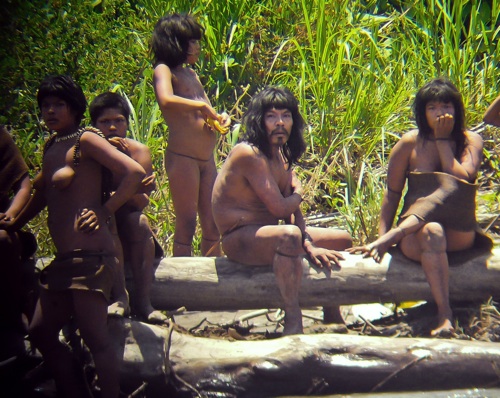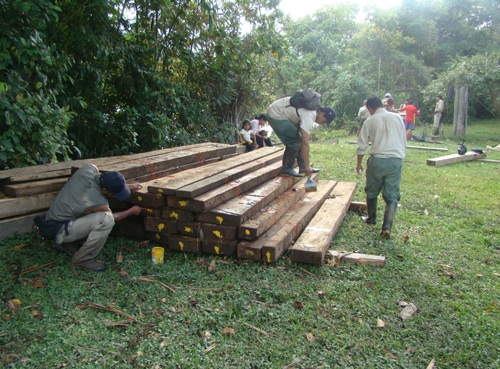

A recent image of the Mashco Piro in Peru. (© D.Cortijo/www.uncontactedtribes.org)
When development encroaches onto native lands where it is not welcome, indigenous people are not the only ones who are affected. A tragic story unfolding in the Peruvian Amazon is currently shedding light on what can happen to innocent bystanders if the developed world doesn't respect indigenous rights.
In November 2011, a Peruvian man by the name of Nicolas "Shaco" Flores was shot and killed with an arrow by the "uncontacted" Amazonian tribe of the Mashco Piro. The tribe has lived in near-complete isolation from the developed world -- until now. Increased sightings of the Mashco Piro in riverside tourist areas have led some to believe that the tribe is moving away from their native lands because their lifestyle is being disrupted by illegal logging and oil drilling projects nearby.
What is especially poignant about the death of Shaco Flores is that he was a friend to the Mashco Piro. He filled the unique role of being a kind of liaison between the tribe and the modern world -- he spoke a little of the tribe's language and sometimes traded tools like machetes and cooking pots with them. According to the National Geographic News Watch piece by Scott Wallace, Flores was shot while tending crops that he probably planned to share with the tribe.
The news reports (see National Geographic or Al Jazeera) sum up several theories of why the Mashco Piro would do such a thing. And the theories all point back to the encroachment of the developed world into an untouched region.
"Unfortunately this incident is not an isolated one, but could have been avoided. It is a very complex and delicate situation," says Rebecca Spooner, a campaigner for the indigenous advocacy group Survival International. Spooner says that the Mashco Piro have been firing "warning shots"--such as arrows without tips, or arrows that fly into the water close to passing boats--at tourists and park guards for some time. "We can deduce that these shots are meant as a warning to leave the Indians alone," Spooner says.

Illegal timber being seized near the Mashco Piro's ancestral lands. (© SERNANP/Survival)
Survival International has a firm stance on respecting the rights of indigenous peoples: the Mashco Piro have a right to be left alone, and they have a right to their land. While this is certainly true, it may be complicated by a diversity of attitudes and desires within the tribe itself. Peruvian locals in the area said they believe there was some disagreement among the Mashco Piro: one faction seemed to want to increase contact with the outside world while another faction didn't. The death of Flores may have been either a warning sign for outsiders such as the loggers to stay away, or it could have been a way to cut off ties with the outside world by eliminating the tribe's one point of contact.
Whatever the tribe's motivations, Flores became the victim of a larger problem: the struggle of indigenous and traditional communities to maintain their lifestyle despite -- or alongside -- a global move toward development. ("Alongside" refers to communities that embrace development but also try to retain their cultural identity.) Flores was the closest tie the Mashco Piro had to the outside world, and although his relationship with the tribe was established in the spirit of helping and giving, it was complicated by fear, dissent within the tribe, and the tribe's struggle to retain ownership of their future. Sometimes even understanding, sensitivity, and friendship are not enough to navigate the complexities of cultural context.
These are some of the delicate issues that arise when two worlds collide, and there are some hard truths we can glean from the story of the Mashco Piro. For one, illegal logging, drilling, or development is always wrong. It runs counter to both UN resolutions and local laws, and campaigns against such illegal activity should be supported. Second, the developed world is not immune to the negative effects of unwelcome development. Recent events on the Mashco Piro's ancestral lands have put the tribe in a desperate position, and what started as warning shots aimed at outsiders has now resulted in a fatality. Whether the death of Shaco Flores was intentional or not, we cannot ignore the fact that unwelcome development in the region has spurred violence, cost at least one human life, and provoked fear and dissent within the community.
There must be a way to continue to support developing countries without alienating the rights and wishes of its indigenous communities, and we need to ask ourselves more seriously how it should be done. These decisions, if not made correctly, can cause the rapid disintegration of societies that have existed for millennia, and it can end up harming those who are blameless as well.